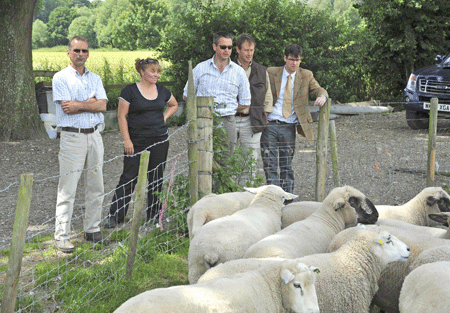FW Awards: Robert and Anna Hawke have a clear vision for the future

- Robert and Anna Hawke
- Salisbury, Wiltshire
As sheep farmers in their own right it’s fair to say Robert and Anna Hawke are relative newcomers, having only been running their own flock for the past three years.
But having spent most of his life shepherding flocks across the UK Robert is more than well aware and equipped to manage the couple’s flock of 650 Romney ewes. And it was Robert’s previous experience of Romney’s while shepherding in Sussex which left the couple in no doubt it was the breed for them.
“We knew we’d have a flock capable of producing good, saleable lambs from the relatively poor grassland we were offered access to. We were, as one local farmer suggested, aimimg to produce something out of nothing,” explains Robert.
“The poor grazing wouldn’t have suited many breeds and could have meant spending excessive amounts on concentrate feeds. But the Romneys have thrived on it and are rearing lambs capable of leaving a decent profit where other breeds would struggle.”
And with a proportion of the flock bred pure, the Hawkes have been able to retain their own replacements, avoiding the need to be at the whim of the replacement ewe market. “As importantly, because Romney ewes last well we have been able to sell four crop ewes onto other flocks as draft ewes for reasonable prices, significantly cutting our depreciation costs on the investment made rearing them.”
This philosophy of maximum return for minimum outlay runs throughout the couple’s flock management and has been behind the instigation of a number of selection criteria for ewes. “We avoid keeping ewes which have needed excessive intervention or had significant problems in the previous year, including lambing assistance, prolapses, feet problems and low udders,” says Anna.
“This selection criteria will be extended to include dag scores and mislaid ewes and all problem ewes are marked or tagged when we handle them. This means they can be culled later in the year and allows us to be rigorous in our selection. Ewe lambs from troublesome ewes are also avoided when selecting replacements to come into the flock.”

But, while their April lambing flock is the established aspect of the business, Robert and Anna are now aiming to start a January lambing flock to maximise the flock’s cash flow. “We have a good local market for boxed lamb and need the ability to supply those customers all year round, particularly as a local farm shop is wanting lamb all year round, too,” says Robert.
This flock may well increase production costs, but Robert is adamant about keeping unnecessary costs out of the business, including machinery spending. “We have no tractor and only have the essential sheep kit we need. As I also contract shepherd we are able to offset some of these costs onto that business, too, further cutting overheads.”
However, while costs may be low, unlike most farm enterprises, this one has no single farm payment to fall back on should times be tough.
“We stand and fall on our ability to farm sheep profitably in a fully decoupled era.
“This means marketing has to be spot on and while we’d like to support live markets, having regular deadweight buyers is better for us at the moment. The boxed lamb scheme is also growing, but we are conscious of the extra costs this incurs, above and beyond standard marketing.”
As an added extra to the enterprise Robert and Anne also run sheepdog training courses, helping novice handlers get to grips with their dogs and aiding those with troublesome dogs to have a better working relationship. “This is an important part of the business and allows an added marketing angle when speaking to prospective clients.” This role is also backed up by the annual sheepdog trial the couple stage on the farm which draws a good crowd and raises money for local charities.
The couple’s aim is to promote their style of sheep farming as a viable opportunity for the younger generation to enter the farming industry and it’s clear their vision and expertise are essential assets in helping them achieve this.
What the judges liked
- Farming profitably without SFP
- Excellent grassland management
- Fitting stock to system
- Marketing awareness
- Helping boost farming’s image
Farm facts
- 80ha (200 acre) grasslamd farm
- 500 ewe Romney flocck
